Like most businesses the management of the day to day running of a company can usually be left to middle management. That’s why such people are employed. However, in the case of policy and investment, the board of directors usually takes on those decisions. The decisions regarding the strategic running of the Cemetery were and are taken in the board room. And the ruler of the board room is usually the chairman of the company. This is a short history of two of the chairmen of the Hull General Cemetery Company.
William Irving, John Pearson Bell and John Solomon Thompson were the first three chairs of the company. John S. Thompson was discussed last month in the Anniversary item. Anniversary 1859
This month let’s concentrate upon the other two men mentioned above. All of these men were of the original shareholders of the Company when it was established. No other chair could make that claim. These three were part of that group who had the original vision. For that we should salute them.
William Irving
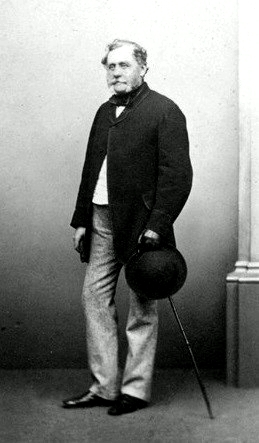
The first Chairman was William Irving junior. Dave Morecambe, who is a descendant of William, wrote about this man in a post last year. The Irving Family
Suffice to say that he was the chair at the provisional meeting in March 1845, held in Bowlalley Lane. When the Company became a viable entity he was replaced by John Solomon Thompson. Whether this was because of pressure of work with his own business one does not know. He still remained on the Board of Directors. When Thompson resigned he took up the chairman’s role once again. This was on the 7th June 1859. His period of chairmanship was to become an eventful period in the life of the Cemetery. Anniversary 1859
The first chapel in Western Cemetery
William was instrumental in having the first chapel built in what was to become Western Cemetery. The foundation stone of this chapel was laid in October 1859. In a long, and no doubt to the Local Board of Health (LBOH) members in the crowd, insensitive speech he commented,
‘They were met to lay the foundation stone of a building to be used as a chapel on ground to be appropriated to the use of the entire borough for the interment of the dead and he might be permitted to say that, in making that offer the cemetery company was not asking the inhabitants of the town to accept from their hands a property which would not reflect any credit on those who had long been engaged in carrying out the project.
Then he remembered what that place was 12 or 13 years ago. A marshy flat without shrub or tree and then when they looked at the beautiful grounds which they all experienced such pleasure in passing through he thought the reverse of credit was due to those who made such a change.
William went on to say
He did trust the town would consider that the company in handing over to them a property like that for the interment of the dead and undertaken to keep it in proper repair and condition were conferring a favour. It had already become a city of the dead and there were not less than 6000 interments there up to the present time.
The company from first to the last of their design, had only at heart the thought of presenting to their town’s people a place where they could be laid with pleasurable feelings and which would prove an ornament to the borough.’
He presented a silver trowel to the mayor, Martin Samuelson, the owner of an iron foundry. This factory was situated on what eventually became known as Sammy’s Pint and where now sits The Deep. On the blade of the trowel it was inscribed, just in case, the Corporation didn’t quite get the message,
‘Hull General Cemetery Company. The foundation stone of the chapel on ground appropriated to the LBOH as the burial board for the borough was laid by the worshipful the mayor, Martin Samuelson esq; 3rd of October, 1859.’
Pearson
Of interest was that in the company commemorating this event stood Zachariah Pearson. He was there in his role as Sheriff. I wonder if he didn’t look around him that day and see what a pleasant place it was and perhaps the idea of a public park was germinated. One can hope so. Finally, Martin Samuelson was given the chance to reply and then the assorted notables in the audience did a very sensible thing. They sat down to a luncheon that was,
‘provided near the gates of the grounds and after the ceremony of the day the company adjourned thither.’
All that talking can raise a thirst.
The fatal mistake
In 1861 William did a foolish thing. However much one looks at it one can’t see any other explanation for it than he threw a ‘hissy fit’. In doing so he condemned the cemetery and the Company to a long, slow, lingering death.
It all started with, to my mind, an innocuous item in a local newspaper. Here it is.
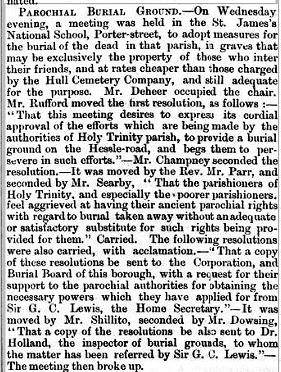
As you can see a fairly typical meeting. Resolutions passed and long winded phrases by politicians signifying nothing. The gist was quite clear enough though. The Hull General Cemetery burial charges were too steep. The new Borough Burial Ground was just another part of the Hull General Cemetery. That the parishioners of Holy Trinity desired and deserved their own burial ground away from the tendrils of the Company. That the churchwardens of that parish should continue to lobby Sophia Broadley for the patch of land on Hessle Road that would become Division Road Cemetery. In essence the usual stuff. So why did William get so wound up about this?
Church versus the Company
For William to take exception to this was foolish. The church authorities had long hated the Cemetery. It had taken much of their earnings from them by providing burial spaces. The Churches had resented this even though their own burial grounds were disgusting and immoral. The plan to seek another burial ground for Holy Trinity had been around before the idea of the Hull General Cemetery was mooted. Once, in 1847, it had almost seemed likely it would happen. However, at a parishioner’s meeting, the idea was voted down as the costs were seen as too prohibitive.
Now with the emergence of the Borough Burial Ground, later to become the nucleus of Western Cemetery, the church authorities thought they would try again. They also knew that Sophia Broadley had a poor opinion of the Company as it had been tardy in paying its debts to her brother, and after his death, to her.
William must have known that even if the new site was acquired in the near future it would be some time before it could function. To get annoyed about this was folly. If it had just been this perhaps it would have all passed off quietly. Sadly, the matter didn’t end there.
The Corporation drops its opposition
A further news item later that month increased William’s ire.
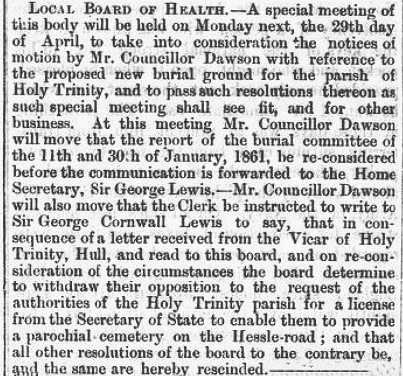
Again, one has to ask, what could have caused William to lose his temper here. To answer that let’s look at the recent past. Back in October William had made a speech already referred to. In that speech he had stated that the grounds of the Borough Burial Ground were ‘handed over’ to the Corporation and were ‘conferring a favour’ on the population of Hull.
As recorded earlier he had gone on to say,
‘The company from first to the last of their design, had only at heart the thought of presenting to their town’s people a place where they could be laid with pleasurable feelings and which would prove an ornament to the borough.’
Betrayal?
This latest news item must have seemed to him to throw those words back in his face. To his mind I would suggest that he could not understand why the Corporation would act in this way. For it would have been the final paragraph of the news item that would have exercised him the most. For now the Corporation were appearing to want to set up a rival to not only the Company’s grounds but also their own. Under the Public Health Act of 1848 the Local Board of Health regulated burials in its district or parishes. As such it could stop any such burial ground being opened. Such as the one Holy Trinity desired to implement. Yet here, it appeared, they would ‘withdraw their opposition’ to this new burial ground. To William this must have seemed like a betrayal.
Why?
Why would the Corporation act against its own vested interests? To William there was only one answer; the Corporation, especially the LBOH, and the Cemetery Company had a long history of distrust. Here was just another attack from them. He obviously felt that whatever trust between the two sides engendered by the opening of the Borough Burial Ground was now gone.
And here he did a foolish thing. He wrote to the Corporation offering to sell them the Borough Burial Ground. He did this without consulting his fellow directors. The letter was faithfully recorded in the minute books of the Company. What isn’t recorded is the reaction of his fellow directors to this other than their acquiescence to his fait accompli.
The letter
Here is the letter.
‘To the Burial Committee, LBOH 8/5/1861
Gentlemen, I have read with surprise the report of your board meeting on the 29th ult and the resolution passed on the occasion. It appears to me that your board is dealing with the burial question have not fairly considered the rights of the Cemetery Company.
At the request of your board the company entered into an arrangement to provide 5 acres of land, then let off as gardens, as and for the place of burial for the inhabitants of the borough; to lay out the same as an ornamental cemetery and also to erect a suitable chapel thereon; and when the ground should be found insufficient the cemetery engaged to provide another suitable and adjoining piece of land and set it apart in the same way for your board.
The cost
These works have been carried out by the company at a cost of £1328 exclusive of land.
The company have justified their part in this agreement to the letter, and also to the satisfaction of your board as the following resolution of the 5/5 1860 will prove Copy of letter from burial board written above, motion moved by Mayfield, seconded by Richardson.
The company, in expending their money to meet the requirements of the board naturally looked to a fair return in the shape of interest on the outlay but your board’s resolution of the 29th ult renders it hopeless. The company think that in arriving at such a decision your board were wholly regardless of the position of the company with your board under the arrangement referred to the effect of your resolution being to deprive this company of the whole or a large part of their anticipation.
The offer to purchase the cemetery
Under these circumstances. I have to suggest whether the proper course for the Local Board of Health to adopt would be to purchase the ground included in the arrangement and thus, by taking the whole affair into their hands, release the cemetery company from their present unsatisfactory position, brought about as it has been by the action of your board.
Should the above suggestion to purchase meet with your views and should your board decide on adopting it, you would then be in a position to provide a family burial place in the board’s cemetery for the fees alone, which you can regulate at your pleasure and thus preserve the management of burials under your own control.
To carry out the suggestion the cemetery company would be willing to sell your board the land included in the arrangement on the following terms, subject to such regulations for preserving unity of design and uniformity of appearance as might be mutually agreed upon.
The purchase price for the site
Say 5 acres of land at £315 per acre (the cost to the company £1575. Amount expended by the company in laying out, draining, planting and erecting a new chapel to meet the requirements of the burial board £1328. Total £2903.
The company would grant a perpetual right of road through the present cemetery, the board contributing their proportion of maintaining it in good order.
The company think that they are fully justified in laying their suggestion before your committee, satisfied that they are entitled to their due consideration at the hands of your board for the large (and as far as they, the company are concerned, unnecessary) outlay they have incurred for the convenience of your board, and they would urge upon the board, through your committee, the necessity under existing circumstances. If your board’s arranging either to purchase the ground as suggested, or to give such compensation as may be mutually agreed upon.
William’s conclusion
In conclusion I may state that the object of the promoters of the cemetery company was to provide for the inhabitants of Hull what so much needed by them, a place of burial for all sects and denominations; to secure to all classes of the community the means of decent and undisturbed sepulture according to the rights of their own religious faith, and to put an end to intramural interments. This has been the aim of the company from its foundation to the present time and it was with this view, and not with the expectation of pecuniary gain that the arrangement with your board was entered into.
Yours
Wm Irving’
Westward No
With this letter William effectively sealed off any hopes of the expansion of the Cemetery to the west.
Naturally enough this letter caused some surprise with the Corporation and they did not respond immediately. It’s possible that further discussions were taking place that are not recorded.
On the 3rd July the minute books record that a vestry meeting had taken place for Holy Trinity and that the decision to buy the Division Road site was passed. As such the Board decided to wait on developments.
By the 28th August things had moved. William had had two meetings with the Local Board of Health with regard to selling them the land. From these meetings the cost of purchasing the land and chapel was priced at £2903. A poor agreement by the Company but they were hamstrung by William’s letter. Later it was costed out that the Company had lost money on the deal. The sale was finalised on the 28th March 1862.
The sale takes place
On the 5th March 1863 at the AGM it was stated that,
‘The sale of the west end was reported. It was also stated that the purchase price had cleared the company of its debts. However, it was also reported that the land that was sold did not make a profit but only broke even in terms of both its cost and the renovating the company had made.’
And this was without taking into account the closing off of any expansion of the Cemetery in that direction.
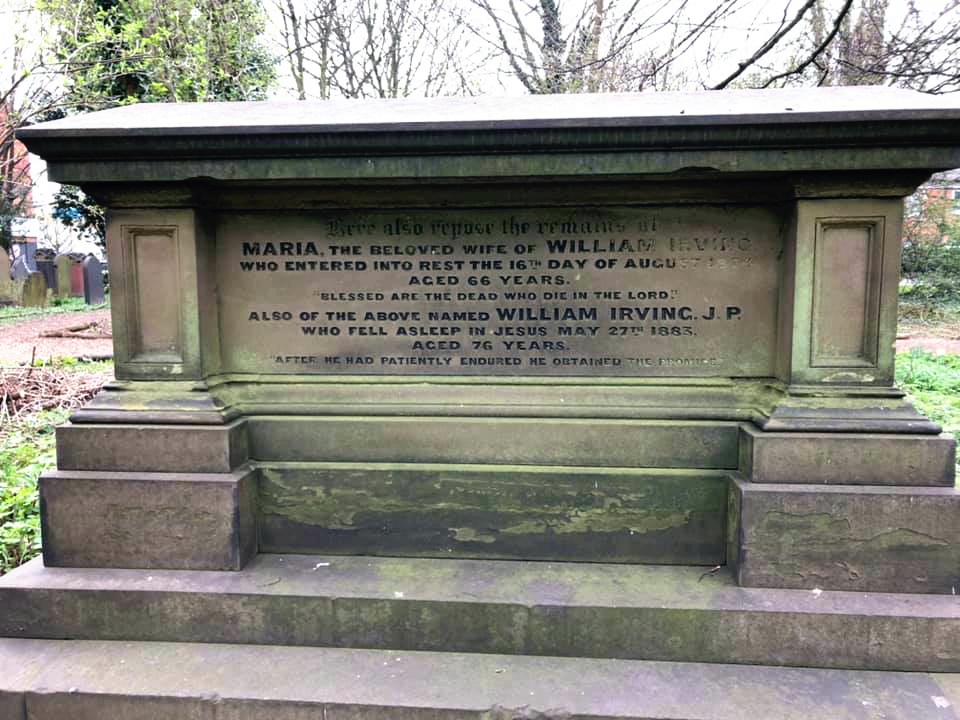
William’s death
William continued to be the chairman of the Company until his death on the 27th May 1883. A resolution was passed at the first Board meeting after his death, It read,
‘That the board of directors hereby record their sense of the very valuable services rendered by the late Mr William Irving, in the promotion of this company, (of which he was one of its first directors and its first chairman) and of his zeal and ability in advocating its interests as a director from its formation and his attention and uniform courtesy as its chairman for the last 24 years. The board of directors beg to tender to the family of their late esteemed chairman their deep sympathy in their present bereavement.’
On the 2nd August 1883 the Board received a letter from Thomas Stratten thanking them for their sympathy for the family at that time. Thomas Stratten was the co-executor of William’s will.
John Pearson Bell
William was replaced by John Pearson Bell. Born in Hull in 1809, he had studied at Glasgow University and the London Medical School to become a doctor. Once qualified he had returned to his native town. In April 1836 he married Louisa Lucy Bowdler. He lived in the South Myton district of Hull. This had some good areas such as Lister Street, where he lived, and English Street. It also had some particularly bad areas. It was known in Hull as the Potteries and some houses were little more than workmen’s huts left over from the brick-making days.
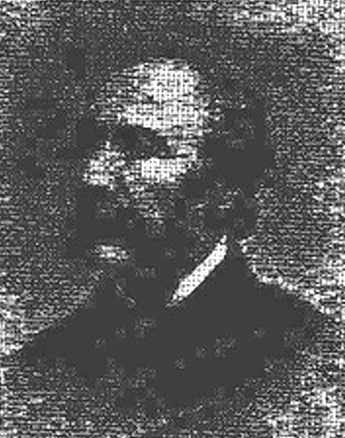
In 1847 he was one of a number of authors of a small pamphlet entitled, ‘The Health of Hull’. In this work, compiled with other doctors, the authors had shown how Hull was poorly equipped to deal with any outbreak of disease. This was to be shown to be tragically true two years later when an outbreak of cholera struck.
Chartism
The following year, in 1848, Dr Bell also raised the issue of Chartism. A life long Tory, he recounted to a local newspaper how shocked he had been when he entered someone’s shop to find a petition.
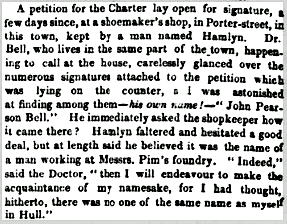
He never did manage to get to the bottom of this and in later years I’m sure he found the whole episode humourous.
John was elected to the Board of Directors of the Company in March 1849. He was influential in the negotiations that took place with the Local Board of Health when that body was trying to buy the Cemetery.
The election of 1852
Around the same time he gave evidence to a parliamentary commission. This had been set up to investigate the corrupt practices that were alleged to have taken place in the election of 1852. This scandal led to Hull not being represented in parliament for two years. (It will come as no surprise to many that I am writing a book about this scandal).
The allegation regarding Dr. Bell was that he gave money to people to vote Tory. One allegation was that he gave money to one voter to buy a litter of pigs. He denied this and other allegations. John said that at no point was he involved in handling any monies. He had acted simply as a Tory election worker. In one exchange where he was the witness he explained the closest he had come to bribing a person in Cottingham to vote,
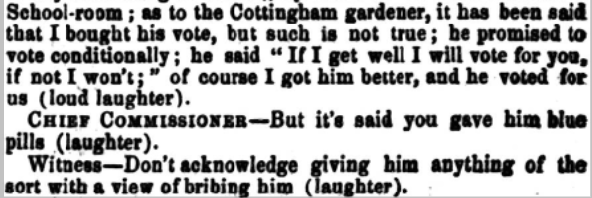
The sanatorium
In 1858 his daughter, Lucy Ann, married Henry Soulby. He also was a medical practitioner and by the 1881 census he and his wife were living at Waverley House, Waverley Street with her parents. In 1861 he and Sir Henry Cooper opened a sanatorium on Beverley Road. The advert for it was quite refined,
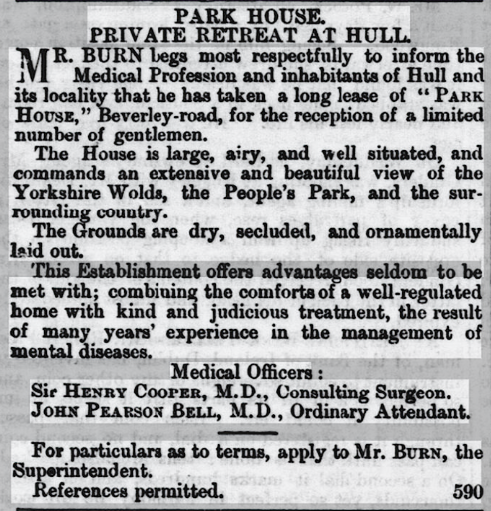
Throughout this period Dr Bell, John Solomon Thompson and other directors were trying to reach an agreement with the landowner to the north of the cemetery. This landowner William Watkinson Wilkinson had long been unfriendly to the Cemetery. If truth be told his animosity was justified. When the cemetery opened they had trespassed upon his land and cut some of his trees down. Since that time a temporary truce had existed but open warfare was rarely far from erupting.
The 1854 Act
This ‘peace’ had not been helped by the 1854 Act of Parliament the Company had gained. In that they had been given the right to extend northwards on to Mr Wilkinson’s land. He could not oppose this compulsory purchase of his land directly but he could negate it at his leisure. In June 1857 things reached a critical point as the minute books show,
‘The solicitor produced a valuation by Mr Wilkinson of the land adjoining the cemetery and reported that he had forwarded a copy thereof to Mr Earnshaw, solicitor for the owner of the land and had a reply from that gentleman declining to accept the Mr Wilkinson’s valuation as the price of such land and the matter having been discussed and Mr George Wilkinson having explained to the board the grounds on which he arrived at his valuation it was moved by the chairman, seconded by Dr Bell that £200 per acre be offered as the price of the land to be clear of all encumbrances except tithe rents.’
Mr George Wilkinson, was the surveyor employed by the Company. He was not related to the landowner Mr. W. W. Wilkinson who had by now passed away. However his estate was managed by his wife who obviously felt it her duty to delay and stop the Company from getting the land.
Another mistake
At the AGM in March 1858 the Chairman’s report spoke of this situation, and once again a strategic mistake was made.
‘The purchase of the land too also remains in abeyance. As our directors have, however, given the owners the necessary notice of their intention and of their wish to have a price named; and not succeeding in this, they instructed Mr Wilkinson, the surveyor, to make a survey and valuation of the land sought to be bought, for the Board’s future guidance, and whose report (confirming your directors views as to its value) is as follows.
‘I have examined the land situate at Newland Tofts, in the parish of Cottingham, adjoining on the north side of HGC belonging to the devises of the late Mr W. Wilkinson esq. and I am of the opinion that the value of the same is £165 per acre or thereabouts, the purchaser paying the tithe commutation rent charge of £3 2s 4d per annum, whether the said rent charge be a little more or less, according to the average price of corn. The price of the 14 acres, 2 roods and 9 perches at this valuation will be £2,401 15s 7d’ signed Mr G. Wilkinson
‘No further steps’
The vendors and their solicitors however having declined to negotiate on Mr Wilkinson’s valuation your directors have taken no further steps in this matter. – It now remains to be considered whether, under existing circumstances it will be prudent to take the next steps pointed out by the land clauses consolidation Act viz; to require the sheriff to give notice to summon a jury to assess the value and compensation for severance, and this step your board does not at present see it prudent, being desirous now, as they have always been desirous, of effecting an amicable arrangement if possible.’
Nowhere to expand
In not acting in trying to gain this land they effectively stopped expansion to the north. As we have seen within a few years they had lost the chance to expand westwards. The Cemetery was enclosed to the south and east by roads. Without new land to sell grave spaces it had to die. That the directors failed to see this, or chose to ignore this fact, is hard to understand.
By 1859 Dr Bell was elected as Deputy Chair. In 1875 he became a J. P. and magistrate. In 1883 he became the Chair of the Company on the death of William Irving.
He was lucky that in his three years as chair there were no serious issues to deal with. The major one was that the Corporation began to develop what is now Spring Bank West and required landowners on either side of the new road to contribute to the ‘making of this public road’. The Company took legal advice which found that they had no legal obligation to do this and therefore they didn’t.
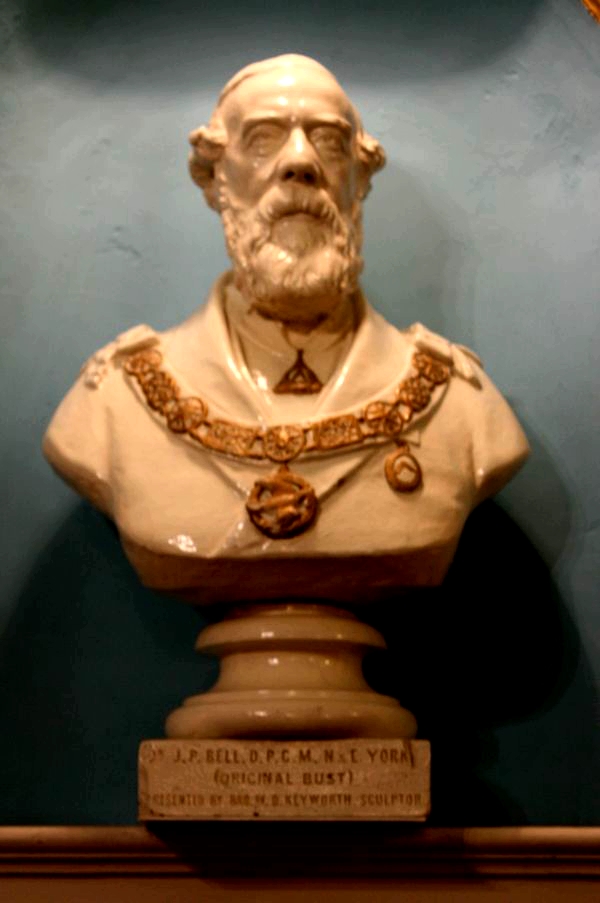
Golden wedding celebrations
In 1886 Dr. Bell and his wife celebrated their Golden Wedding Anniversary. He was presented with a bust as a gift, commissioned by his Freemason Lodge, and executed by William Day Keyworth. He presented his wife with a diamond ring. Just a few short months after this he died.
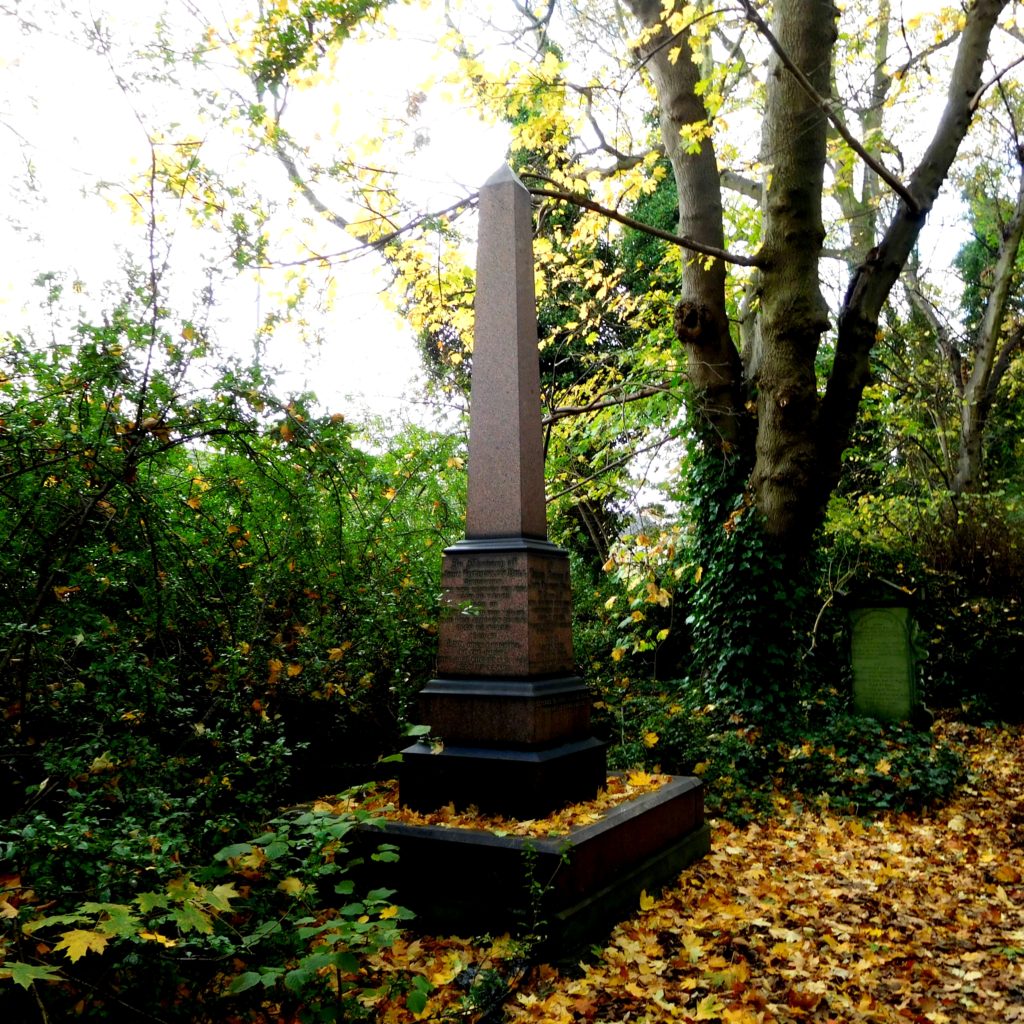
Dr Bell’s death
Dr, Bell’s death was noted in the minute books by his fellow Directors,
‘Mr Oldham, the deputy chair, having alluded to the loss the company had sustained by the death of their esteemed chairman Dr. Bell which took place on the 26th ultimo; and the directors being desirous of recording their sense of the valuable services rendered by Dr Bell to the company and of tendering their sympathy with his family in their bereavement
It was resolved that the board of directors of the HGCC herby record their sense of the very valuable services rendered by the late Dr Bell in the promotion of the company (of which he was one of the original trustees) and of his zeal and ability in advocating its interest as a director for over 37 years and as chairman during the last 3 years. The directors beg to tender to Mrs Bell and the family their deep sympathy in the bereavement sustained by them through his death.’ A copy of this resolution sent to family.’
Conclusion
With the death of John Pearson Bell the next chairman was not one of the originators of the cemetery. The baton had now been passed on to the ‘next generation’. Some of the originators of the cemetery were still there in the board room. However they would not and could not lead the project any longer. Their time had passed.
It could be argued however that whoever took over, the cemetery’s time had also passed. It had lost its way and could no longer expand. The role of all the future chairmen of the Company could now be best described as running a continual damage limitation exercise. A sad end to a glorious project.
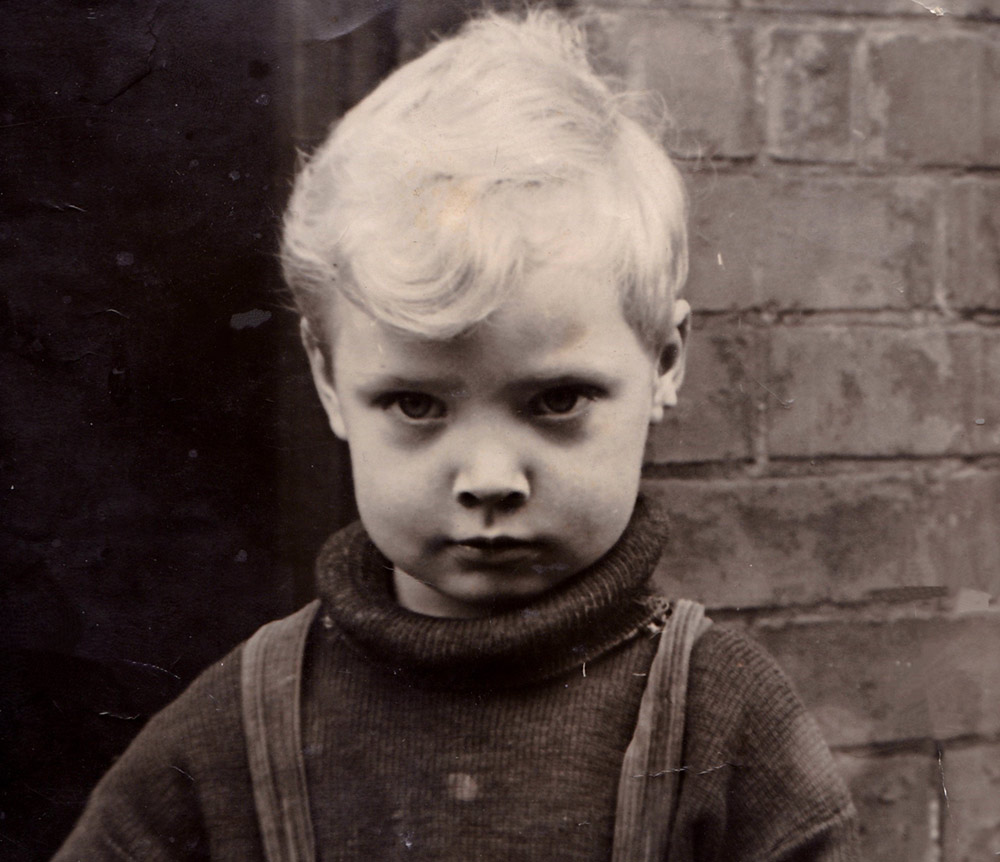
Pete Lowden is a member of the Friends of Hull General Cemetery committee which is committed to reclaiming the cemetery and returning it back to a community resource.

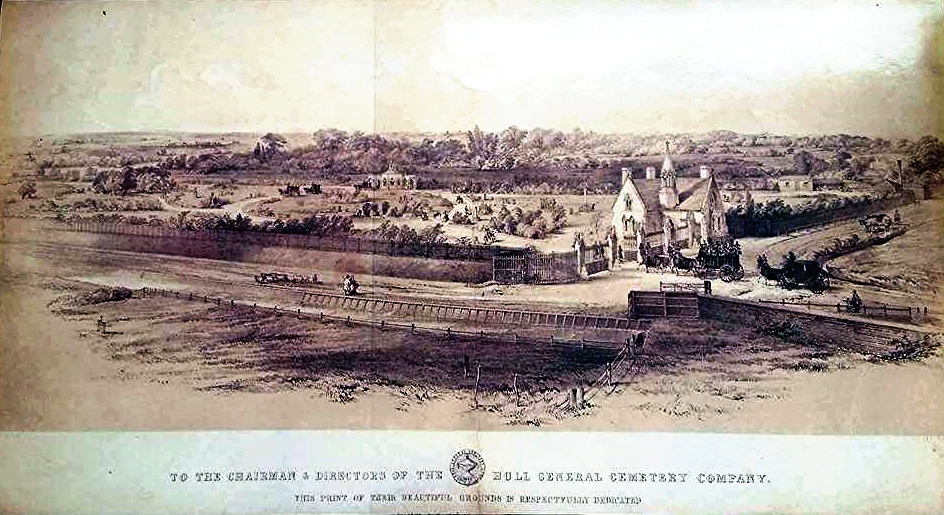
Lots of great pics and notes by Helen and detailed research by Pete. Thank you both